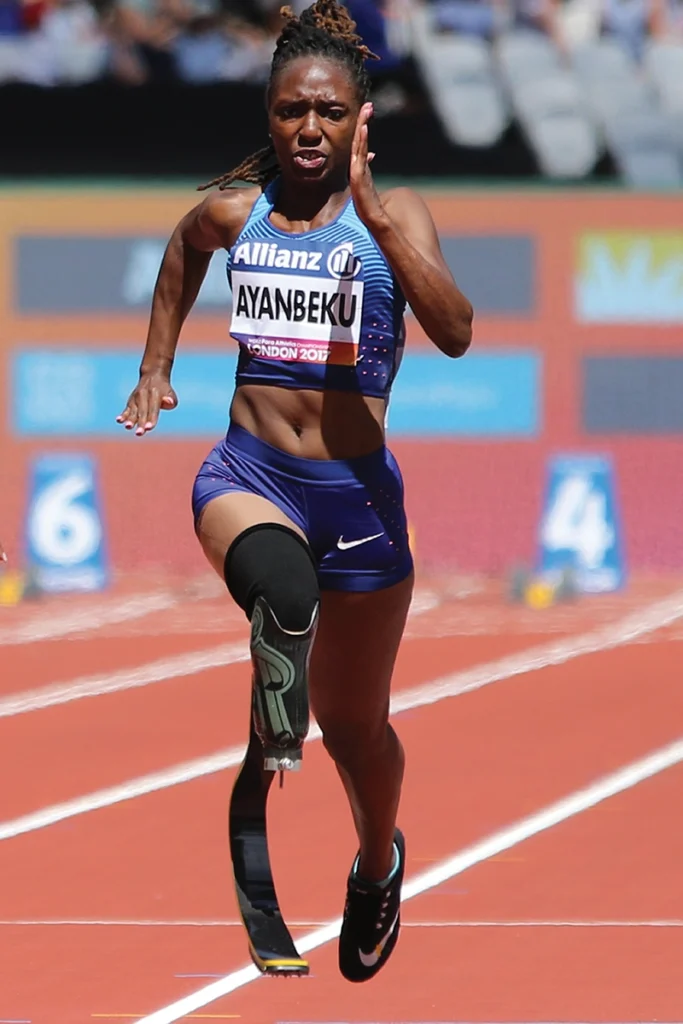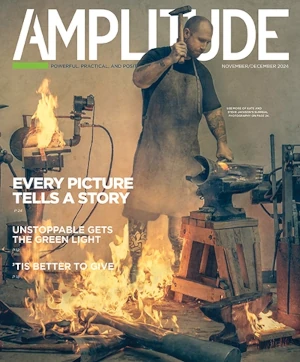
After breaking the tape in the 100 meter dash at the Paralympic Trials this past weekend, Femita Ayanbeku burst into tears. She posted a time of 13.01 seconds, her fastest mark since the 2021 Trials, when Ayanbeku ranked second in the world and loomed as a Paralympic gold-medal contender. A poorly timed case of COVID ruined her hopes for a medal in Tokyo, and Ayanbeku spent the better part of two years languishing outside the top tier in her classification (T64).
When she got pregnant last spring, Ayanbeku continued to train with an eye toward the 2024 Paralympics. But after delivering a healthy baby girl in January, she had to take six full weeks of rest (per doctors’ orders) before resuming her workout regimen. The Trials were her first competitive race in more than a year, and Ayanbeku had no idea how she’d perform—and no guarantee of earning a spot on Team USA’s roster for Paris.
So her winning performance at the Trials—the fifth-fastest time by any T64 sprinter so far in 2024—made a powerful statement about Ayanbaku’s readiness to take on the world’s best. It also validated her quest to fight her way back into world-class shape just six months after childbirth.
“Everybody was telling me to take the year off,” she told the broadcast booth after the race. “I was taking my daughter to the track with me, taking her to lift. It was a lot. But I was so determined. I knew I could do it, but to actually do it feels like . . . . I can’t even describe the feeling. I just want to go hug my baby.”
We talked to Ayanbeku back in February about her physical recovery, her interactions with other athlete-moms, and her busy schedule of public speaking and sponsorship appearances, including a new partnership with Boston-based investment firm Natixis. You can follow her on Instagram at @femitaayanbeku. Our conversation has been edited for length.
As a new mom, that’s a path that not too many Paralympians or Olympians have tried before. Have you spoken with any of the previous athletes who have competed after delivering a child?
I went to a Women’s Sports Foundation event back in November, and I spoke to a few different athlete moms. Everybody was encouraging me but telling me to be realistic at the same time, because it’s definitely a lot, getting back into training and competing. But I’m very hopeful because I’m such a determined person, and I always had the idea that I wanted to be a competing mom so that my daughter or my son could see their mom accomplishing great things. I have a different type of motivation that’s pushing me right now. I was very thankful that my daughter was born in January because our trials aren’t until July, so I feel like I have enough time to spend time with her, but also enough time to get back into training.
What does the timetable look like as you plan out between now and July?
If I could safely start training today, I would, but everybody’s telling me to hold off. She’s only about two and a half weeks old now, and the recommended timeline is six weeks. But I definitely can’t hold off for six weeks. I’ve started doing some walking, and I have a treadmill here at my house. So I’ve done as much exercise as I can like while holding her. I will probably be back to running in the first week of March.
Has the break from intensive physical training been an opportunity of sorts? Have you been able to use this time to work on the mental side of things?
Definitely. That mental aspect of it has been hard, considering I’ve just been on “go” for the last eight years, with training and traveling and competing. I’ve been going to therapy and trying to stay on top of being the best mom I can be. Eventually I’m gonna try to start incorporating how to juggle it all, but for now I’m just trying to take care of myself mentally, and taking the time to recover physically. And you know, sometimes recovery is more important than the actual training.
Do you have any role models who have succeeded as competing moms?
Allyson Felix is definitely my top role model there. I haven’t been able to connect with her directly, but I definitely have followed her story and her journey as a mom, and then getting back into being a full-time athlete.
What sort of things have you learned from her experience?
I just want to be realistic. I don’t want to put too much pressure on myself or set my goals too high. Because if I get headstrong about what I want to do and then I don’t do it, it’s gonna hurt me more than setting ambitious goals will help me. In Tokyo, I had such high expectations, and then COVID came and took everything away from me. Being in isolation for seven days, and then competing after not practicing or getting on the track, I still felt I was supposed to go out there and win gold. So I came back in a very hard place after Tokyo, with setting my expectations so high. Now, after just having a baby, I don’t want to set my expectations so high to where I’ll be disappointed and feel down on myself, even though I am going to be doing the best that I can. I gotta stay in the right place with that. Have expectations, but be realistic.
But I will tell you that I don’t plan on coming back to a lesser position than I was when I left. And long range, the world record has always been the goal. I was right there pushing that world record back in 2021, and that’s always going to be the goal. But this year, like I said, I just don’t want to come back further behind than I was when I left. When I left, I was the national champion, so I’m trying to come in on that foot at the very least. World records, we’ll see.
T64 is a very competitive classification on the American team. There’s a lot of talent there with Sydney Barta and Beatriz Hatz. Are the three of you close? Are there intense rivalries?
We’ve practiced together. I’m older than the two of them, but I think we’re all pretty friendly. Me and Beatriz have a sisterly love, but we’re competitors so we always keep that edge on each other. But for the most part, we’re all looking for each other to get better. When we step off the track, it’s all hugs and congratulations and all that type of stuff. But it’s fun to be competitive, too. Because when we step onto the track, I’m looking at them and thinking: “That’s my friend over there, and we’re gonna have a good time, but we’re going to see who can win.” We don’t have to be mean about it, because everybody’s just going to do the best that they can.
When you and I talked before Tokyo, you mentioned April Holmes as someone who set an example for younger adaptive athletes, particularly women. Do you feel like you’re growing into that role now that you’ve been in the Paralympics twice and you’ve been through all the ups and downs?
It’s been great to work with Noelle Lambert. I got her together with my coach, and we have been training together for the last three or four years. Jerome Singleton and April Holmes welcomed me in and showed me the ropes to everything. I was looking to do that with Noelle, and now she is setting American records in long jump. April Holmes was able to inspire me and push me, and I’ve been trying to do that with Noelle.
I’m definitely still in that mindset. I’m on the board of two nonprofit organizations, just trying to keep this momentum going of growing Paralympic sports and letting disabled athletes know that they can achieve whatever they work hard for. So I’ve been very happy in doing that.
Talk to me a little bit about the sponsorship you have with Natixis. How did that that relationship come about?
Public speaking is one of my great passions at this point. There’s no better way to get the word out there than for me to literally show up, tell my story, and break the bubble of curiosity that people have about disabled athletes. I went to Natixis and spoke to their employees, and it was a great experience. I had so much good feedback from them, so we just kept in contact. I learned that Natixis was one of the sponsors for the Olympics and that they sponsored Olympic athletes, and they didn’t have an athlete like myself on their team. So it just went hand in hand.
It feels to me that there’s more awareness about the Paralympics this year than there was in 2021. It also feels that the coverage is less about novelty and more about pure competition.
Oh, absolutely. We’re definitely headed in that direction. It’s been a huge since I went to Rio in 2016. We are straying away from sob stories about disability. This year, we’ll really be able to focus on the true skills and the real athleticism of the athletes, as opposed to our disabilities.
I know this is a premature question, but 2028 is already on the horizon. Can you even afford to look that far downstream?
This year is basically a trial year. It’s the first year I’m going into the Games with a child and this new life that I’ll have. I’m going to do everything I can to make this year special. Then I’ll have the next four years to get it together and be exactly where I want to be going into LA. I can say with confidence that when my daughter is four years old, she’ll be able to come to LA to see Mommy do her thing, and I will bow out gracefully after I win the gold. I definitely will be retiring after LA, so I just want to get it all out of my system while I still feel like I’m ready to go. I’m just thriving off of that feeling while I still have it.




